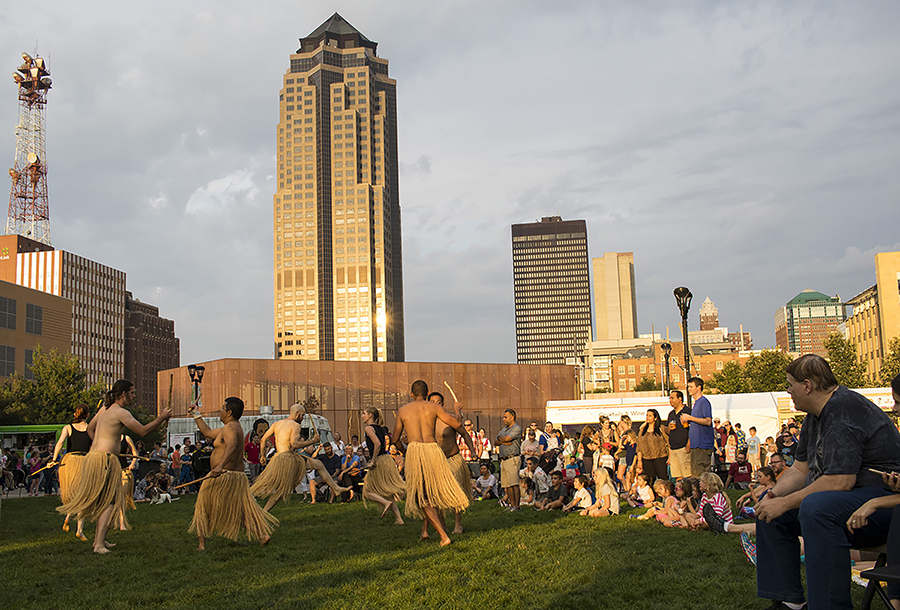November Member Spotlight
This month, GIA’s Member Spotlight goes to Iowa Arts Council, the state arts agency that, among other things, awards grants and designations that serve as catalysts for innovative community initiatives, creative projects, and dynamic cultural organizations. Read about the agency here.
From the GIA Reader
In “Arts in Society: A case study in collaborative cross-sector grantmaking,” part of the GIA Reader Vol 30, No 3 (Fall 2019) issue, Libby Barbee writes about the Bonfils-Stanton and Hemera Foundations’ journey joining forces in 2016 to pilot the Arts in Society grant program and how grantmakers can amplify their impact through collaboration. Click to read.
Webinar Today: “After the Story, Comes the Critique: Funders leading narrative change efforts”
Critics, like storytellers, have a powerful role in contextualizing narratives. They can uniquely intercede with a counter story, offer deeper historical exposition, or highlight an alternative shared experience while advocating for silenced voices. In this webinar we’re interested in exploring what’s possible when the critics voice is from the ALAANA (African, Latinx, Asian, Arab, and Native American) community, their impact upon the field, and what role funders can play.
Join us as we close GIA’s narrative change series with this webinar today at 3pm EST/11am PST with Chi-hui Yang (Ford Foundation) and Elizabeth Méndez Berry (The Nathan Cummings Foundation). They will lead discussion on media critique, speak to their collaborative project Critical Minded, and share how funders can lead narrative change. Details and registration here.
Join us as we close GIA’s narrative change series with this webinar today at 3pm EST/11am PST with Chi-hui Yang (Ford Foundation) and Elizabeth Méndez Berry (The Nathan Cummings Foundation). They will lead discussion on media critique, speak to their collaborative project Critical Minded, and share how funders can lead narrative change. Details and registration here.
“I Already Fund ALAANA Arts Organizations—Now What?” Webinar
GIA is committed to addressing structural inequities and increasing philanthropic and government support for African, Latinx, Asian, Arab, and Native American (ALAANA) artists and arts organizations. Creating racial equity statements and threading racial equity practices and policies into our work are concrete and important actions to take in order to achieve racial justice. However, there is more to it than that. Funders still need to keep the momentum going, delving more deeply into power structures, partnership, and resistance. But how?
Join us for this racial equity webinar on Tuesday, December 3, at 2pm EDT/11am PDT with Maurine Knighton (Doris Duke Charitable Foundation) and Lori Villarosa (Philanthropic Initiative for Racial Equity). In this webinar they will take us into a deep discussion on what funders can consider as they continue funding with racial equity at the forefront. Details and registration here.
Join us for this racial equity webinar on Tuesday, December 3, at 2pm EDT/11am PDT with Maurine Knighton (Doris Duke Charitable Foundation) and Lori Villarosa (Philanthropic Initiative for Racial Equity). In this webinar they will take us into a deep discussion on what funders can consider as they continue funding with racial equity at the forefront. Details and registration here.

The Andrew W. Mellon Foundation awarded recently $750,000 to the Civil Rights and Restorative Justice Project (CRRJ) at Northeastern University School of Law to support its work in investigating and archiving acts of racial terror in the South between 1930 and the 1970s, explains the annoucement…
An article in Stanford Social Innovation Review tells the story of a 1970s partnership between wealthy white liberals and black activists “to improve race relations and the living standards of urban black citizens in Boston”…
In a recent post, Melissa A. Berman, Renee Karibi-Whyte, and Olga Tarasov of Rockefeller Philanthropy Advisors, state that “trust in philanthropy is eroding”…
A new Artist in Residence Program was announced by the Rhode Island State Council on the Arts (RISCA) and the Rhode Island Department of Health (RIDOH), the National Assembly of State Arts Agencies (NASAA) reported in a blog post…

